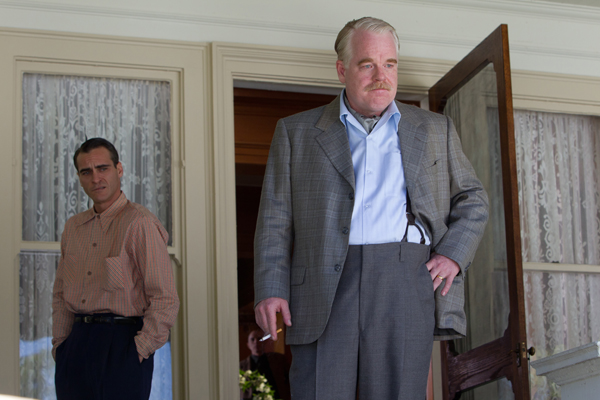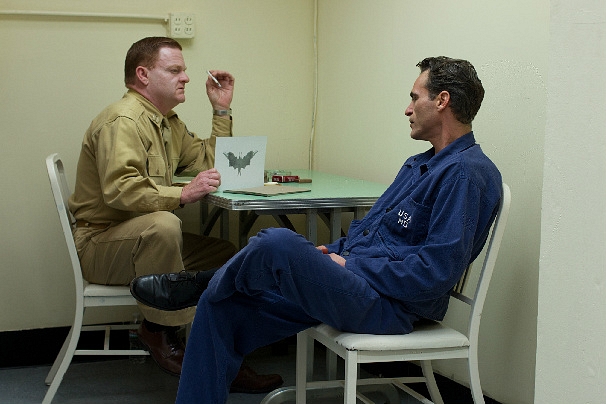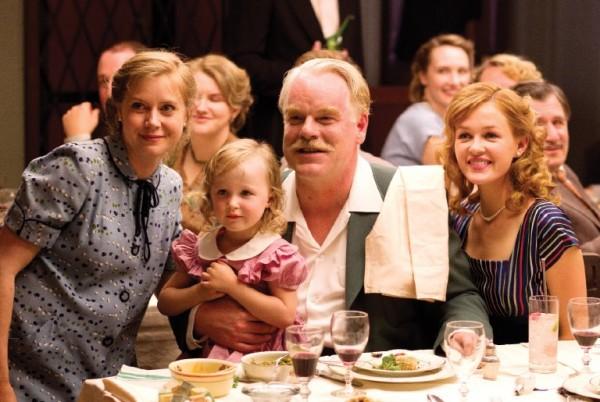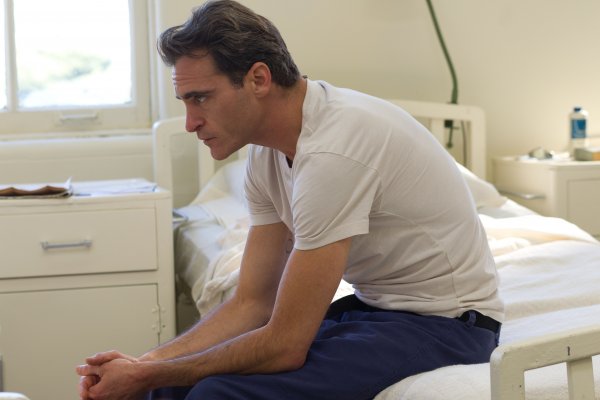The Master Review
Steven's Rating: 8/10
Player Affinity Composite Rating: 7.8/10
(3 reviews total)
Paul Thomas Anderson’s films have a tendency to take you by the shoulders and shake you rigorously, to leave you with an unforgettable scene, moment or quote (“I drink your milkshake!”, anyone?).
The Master short-changes none of us on lasting images, but the fearless director’s long-awaited return to film after six years is less visceral; it rattles, but from the neck up.
The Master juxtaposes man at his most calculating and intellectual (a charismatic and commanding philosopher and semi-religious figurehead played by Philip Seymour Hoffman) with man at his most animalistic and unpredictable (a World War II naval veteran suffering from alcoholism and PTSD played by Joaquin Phoenix). Lancaster Dodd and Freddie Quell, respectively, seek each other for different reasons, and their combination produces the reaction that Anderson wished to capture with this film.

Anderson begins with a thorough psychological portrait of Freddie. It’s pretty straightforward: his greatest passion in life appears to be making hard liquor by scavenging for hazardous chemicals, his subconscious is complete preoccupied with sex and when he feels the slightest bit threatened, he lashes out violently. In the first five years after the war, he travels about looking for work, only to make the same mistakes over and over again. One day in 1950, he awakens hungover on Dodd’s boat and a new chapter in his life begins.
Rather than throwing a drunk off his boat, Dodd determines to keep Freddie after tasting his latest liquor creation. But for a man of Dodd’s stature, it’s clear that he’s interested in what Freddie might offer to his theories and vice-versa. Freddie becomes a willing guinea pig in a sense, traveling with the Dodd family, which includes his wife, Peggy (Amy Adams) and his many children (most from previous marriages).
Over time we learn more and more about exactly what Dodd believes and what his theories are, but not so much that the film becomes about religious “cults” entirely. Nonetheless, this element distracts a bit from examining the emotional core of the film, that being these two men and how they learn from each other.

We watch as Freddie both succeeds and struggles in his new environment, subjecting himself to Dodd’s exercises and therapy sessions. Phoenix and Hoffman excel in their respective roles both together and separately. Given the nature of their characters, Phoenix takes a more method approach (as he’s been known to do) and brings a physicality to Freddie that makes him a combination of convincing, sympathetic and someone you’d avoid eye contact with in public. As a man so up in head, Hoffman and Anderson work together to give Dodd a quick fuse, a man yearning for a certain physical freedom despite how it contradicts the entire foundation of his beliefs.
Driving the entire story is the question of whether Dodd’s practices can “cure” Freddie, or if they even should. This is where Adams’ Peggy comes into play as the wife who refuses to let Dodd flinch from his goals. She fears Freddie will be his undoing, that he’s beyond their help and will only instead weaken their cause. Adams plays successfully against her type as a woman firmly in control; she’s stronger than Dodd, but the catch is she’s significantly colder and less likable. Peggy provides almost a white balance or comparison point so we can more clearly see Dodd’s weaknesses, or as some would argue, his humanity.

The unquestionable brilliance of
The Master is the creative way Anderson builds the film’s entire tone around the conflicting sides of human nature that both Freddie and Dodd represent. In several moments, it’s easy to lose focus on the thoughtful, theoretical dialogue because in the same scene we’re usually presented with some kind of carnal distraction. (You might be surprised at how perverse Anderson is willing to go to make this point ... might.) The back and forth that occurs over the run time between emotionally reacting to the film and thinking about it, makes the experience of
The Master rather challenging, but upon reflection, as an idea, it’s a stroke of genius.
Yet there’s a certain emotional distance between
The Master and its audience, which doesn’t seem right for an Anderson film. As “average people,” we identify somewhere in between Freddie and Dodd in terms of the balance between pleasures both biological and intellectual, and as such, it becomes difficult to fully identify with either character. The film’s climactic moments consequently feel empty, unfulfilling.

Only through serious thought or discussion does Anderson’s intention and message reveal itself, but when it does (and this is contingent on the individual viewer, of course), it’s something of a revelation. The film really excels as a psychological study of two characters both as individuals and together, so as a film about ideas and theories on human nature, how we live fulfilling lives and who we look to for guidance/answers and why,
The Master is incredible, intelligent and stimulating, and significantly more than most films that aim to do anything similar.
Anyone who sees
The Master already expects to leave with a lot to chew on, but take that on double it. Anderson has given us less of a powerful story and more of a powerful way to explore ideas and thoughts about human nature. It’s not entirely without heart or emotional resonance thanks to its tour-de-force leading performances, another non-traditional but captivating Johnny Greenwood score and gorgeous period visuals thanks to the 65 mm, but there’s no question
The Master leans a bit heavily on affairs of the mind.
Rating: 8/10
 Ethan thought:
Ethan thought: "
The Master is not a comfortable sit. There are plenty of horror films that are a breeze compared to this festering wound of a movie. As WWII veteran/mental case Freddy Quell, Joaquin Phoenix is almost too good – there’s an edge of genuine madness to his performance that makes you wonder if he didn’t really go down the rabbit hole making faux-documentary
I’m Still Here after all. When it comes to his scenes with the (appropriately) masterful Philip Seymour Hoffman, it’s impossible to look away. P.T. Anderson’s film is an exacting, exhausting portrayal of the symbiotic relationship between two terribly incomplete men, but does the film itself add up to something? Anderson’s imagery is immaculately designed and Jonny Greenwood’s score is fantastic, but on the whole
The Master feels like a jigsaw puzzle with one piece missing. It’s much more aloof and obscure than Anderson’s previous film,
There Will Be Blood (which was no crowd-pleaser either); it doesn’t really satisfy, but it certainly provokes."
Rating: 8/10
John thought: "
The Master is a story about control, passion, repression, losing oneself, finding oneself, and yes, a cult. But above all, it is the story of a man, a hopelessly inquisitive man, just like you will be by the end of Anderson's sprawling puzzle of a film. While he coaxes two incredibly dynamic performances out of Phoenix and Hoffman, Anderson is working on a whole new level of opaqueness. His direction here is like a cubist's painting. Some will see a masterpiece worthy of comparisons to Picasso (or in this case, Kubrick), while others will see incongruity — squiggly lines, if you will — and scream, 'what's the fuss?' Neither view is wrong, incidentally, as
The Master proves both a
captivating and frustratingly chilly work of art. There's something alien about the picture that undeniably leaves something to be desired in the moment, but the subsequent food for thought is enough on its own to give the film a pass. Coupled with the aforementioned performances and Anderson's signature technical bravado, there's no debating
The Master is a work worthy of Anderson's still blemishless filmography. Narratively, however, it's a big pile of 'meh.'"
Rating: 7.5/10
 Anderson begins with a thorough psychological portrait of Freddie. It’s pretty straightforward: his greatest passion in life appears to be making hard liquor by scavenging for hazardous chemicals, his subconscious is complete preoccupied with sex and when he feels the slightest bit threatened, he lashes out violently. In the first five years after the war, he travels about looking for work, only to make the same mistakes over and over again. One day in 1950, he awakens hungover on Dodd’s boat and a new chapter in his life begins.
Rather than throwing a drunk off his boat, Dodd determines to keep Freddie after tasting his latest liquor creation. But for a man of Dodd’s stature, it’s clear that he’s interested in what Freddie might offer to his theories and vice-versa. Freddie becomes a willing guinea pig in a sense, traveling with the Dodd family, which includes his wife, Peggy (Amy Adams) and his many children (most from previous marriages).
Over time we learn more and more about exactly what Dodd believes and what his theories are, but not so much that the film becomes about religious “cults” entirely. Nonetheless, this element distracts a bit from examining the emotional core of the film, that being these two men and how they learn from each other.
Anderson begins with a thorough psychological portrait of Freddie. It’s pretty straightforward: his greatest passion in life appears to be making hard liquor by scavenging for hazardous chemicals, his subconscious is complete preoccupied with sex and when he feels the slightest bit threatened, he lashes out violently. In the first five years after the war, he travels about looking for work, only to make the same mistakes over and over again. One day in 1950, he awakens hungover on Dodd’s boat and a new chapter in his life begins.
Rather than throwing a drunk off his boat, Dodd determines to keep Freddie after tasting his latest liquor creation. But for a man of Dodd’s stature, it’s clear that he’s interested in what Freddie might offer to his theories and vice-versa. Freddie becomes a willing guinea pig in a sense, traveling with the Dodd family, which includes his wife, Peggy (Amy Adams) and his many children (most from previous marriages).
Over time we learn more and more about exactly what Dodd believes and what his theories are, but not so much that the film becomes about religious “cults” entirely. Nonetheless, this element distracts a bit from examining the emotional core of the film, that being these two men and how they learn from each other.
 We watch as Freddie both succeeds and struggles in his new environment, subjecting himself to Dodd’s exercises and therapy sessions. Phoenix and Hoffman excel in their respective roles both together and separately. Given the nature of their characters, Phoenix takes a more method approach (as he’s been known to do) and brings a physicality to Freddie that makes him a combination of convincing, sympathetic and someone you’d avoid eye contact with in public. As a man so up in head, Hoffman and Anderson work together to give Dodd a quick fuse, a man yearning for a certain physical freedom despite how it contradicts the entire foundation of his beliefs.
Driving the entire story is the question of whether Dodd’s practices can “cure” Freddie, or if they even should. This is where Adams’ Peggy comes into play as the wife who refuses to let Dodd flinch from his goals. She fears Freddie will be his undoing, that he’s beyond their help and will only instead weaken their cause. Adams plays successfully against her type as a woman firmly in control; she’s stronger than Dodd, but the catch is she’s significantly colder and less likable. Peggy provides almost a white balance or comparison point so we can more clearly see Dodd’s weaknesses, or as some would argue, his humanity.
We watch as Freddie both succeeds and struggles in his new environment, subjecting himself to Dodd’s exercises and therapy sessions. Phoenix and Hoffman excel in their respective roles both together and separately. Given the nature of their characters, Phoenix takes a more method approach (as he’s been known to do) and brings a physicality to Freddie that makes him a combination of convincing, sympathetic and someone you’d avoid eye contact with in public. As a man so up in head, Hoffman and Anderson work together to give Dodd a quick fuse, a man yearning for a certain physical freedom despite how it contradicts the entire foundation of his beliefs.
Driving the entire story is the question of whether Dodd’s practices can “cure” Freddie, or if they even should. This is where Adams’ Peggy comes into play as the wife who refuses to let Dodd flinch from his goals. She fears Freddie will be his undoing, that he’s beyond their help and will only instead weaken their cause. Adams plays successfully against her type as a woman firmly in control; she’s stronger than Dodd, but the catch is she’s significantly colder and less likable. Peggy provides almost a white balance or comparison point so we can more clearly see Dodd’s weaknesses, or as some would argue, his humanity.
 The unquestionable brilliance of The Master is the creative way Anderson builds the film’s entire tone around the conflicting sides of human nature that both Freddie and Dodd represent. In several moments, it’s easy to lose focus on the thoughtful, theoretical dialogue because in the same scene we’re usually presented with some kind of carnal distraction. (You might be surprised at how perverse Anderson is willing to go to make this point ... might.) The back and forth that occurs over the run time between emotionally reacting to the film and thinking about it, makes the experience of The Master rather challenging, but upon reflection, as an idea, it’s a stroke of genius.
Yet there’s a certain emotional distance between The Master and its audience, which doesn’t seem right for an Anderson film. As “average people,” we identify somewhere in between Freddie and Dodd in terms of the balance between pleasures both biological and intellectual, and as such, it becomes difficult to fully identify with either character. The film’s climactic moments consequently feel empty, unfulfilling.
The unquestionable brilliance of The Master is the creative way Anderson builds the film’s entire tone around the conflicting sides of human nature that both Freddie and Dodd represent. In several moments, it’s easy to lose focus on the thoughtful, theoretical dialogue because in the same scene we’re usually presented with some kind of carnal distraction. (You might be surprised at how perverse Anderson is willing to go to make this point ... might.) The back and forth that occurs over the run time between emotionally reacting to the film and thinking about it, makes the experience of The Master rather challenging, but upon reflection, as an idea, it’s a stroke of genius.
Yet there’s a certain emotional distance between The Master and its audience, which doesn’t seem right for an Anderson film. As “average people,” we identify somewhere in between Freddie and Dodd in terms of the balance between pleasures both biological and intellectual, and as such, it becomes difficult to fully identify with either character. The film’s climactic moments consequently feel empty, unfulfilling.
 Only through serious thought or discussion does Anderson’s intention and message reveal itself, but when it does (and this is contingent on the individual viewer, of course), it’s something of a revelation. The film really excels as a psychological study of two characters both as individuals and together, so as a film about ideas and theories on human nature, how we live fulfilling lives and who we look to for guidance/answers and why, The Master is incredible, intelligent and stimulating, and significantly more than most films that aim to do anything similar.
Anyone who sees The Master already expects to leave with a lot to chew on, but take that on double it. Anderson has given us less of a powerful story and more of a powerful way to explore ideas and thoughts about human nature. It’s not entirely without heart or emotional resonance thanks to its tour-de-force leading performances, another non-traditional but captivating Johnny Greenwood score and gorgeous period visuals thanks to the 65 mm, but there’s no question The Master leans a bit heavily on affairs of the mind. Rating: 8/10
Only through serious thought or discussion does Anderson’s intention and message reveal itself, but when it does (and this is contingent on the individual viewer, of course), it’s something of a revelation. The film really excels as a psychological study of two characters both as individuals and together, so as a film about ideas and theories on human nature, how we live fulfilling lives and who we look to for guidance/answers and why, The Master is incredible, intelligent and stimulating, and significantly more than most films that aim to do anything similar.
Anyone who sees The Master already expects to leave with a lot to chew on, but take that on double it. Anderson has given us less of a powerful story and more of a powerful way to explore ideas and thoughts about human nature. It’s not entirely without heart or emotional resonance thanks to its tour-de-force leading performances, another non-traditional but captivating Johnny Greenwood score and gorgeous period visuals thanks to the 65 mm, but there’s no question The Master leans a bit heavily on affairs of the mind. Rating: 8/10
 Ethan thought: "The Master is not a comfortable sit. There are plenty of horror films that are a breeze compared to this festering wound of a movie. As WWII veteran/mental case Freddy Quell, Joaquin Phoenix is almost too good – there’s an edge of genuine madness to his performance that makes you wonder if he didn’t really go down the rabbit hole making faux-documentary I’m Still Here after all. When it comes to his scenes with the (appropriately) masterful Philip Seymour Hoffman, it’s impossible to look away. P.T. Anderson’s film is an exacting, exhausting portrayal of the symbiotic relationship between two terribly incomplete men, but does the film itself add up to something? Anderson’s imagery is immaculately designed and Jonny Greenwood’s score is fantastic, but on the whole The Master feels like a jigsaw puzzle with one piece missing. It’s much more aloof and obscure than Anderson’s previous film, There Will Be Blood (which was no crowd-pleaser either); it doesn’t really satisfy, but it certainly provokes." Rating: 8/10
John thought: "The Master is a story about control, passion, repression, losing oneself, finding oneself, and yes, a cult. But above all, it is the story of a man, a hopelessly inquisitive man, just like you will be by the end of Anderson's sprawling puzzle of a film. While he coaxes two incredibly dynamic performances out of Phoenix and Hoffman, Anderson is working on a whole new level of opaqueness. His direction here is like a cubist's painting. Some will see a masterpiece worthy of comparisons to Picasso (or in this case, Kubrick), while others will see incongruity — squiggly lines, if you will — and scream, 'what's the fuss?' Neither view is wrong, incidentally, as The Master proves both a
captivating and frustratingly chilly work of art. There's something alien about the picture that undeniably leaves something to be desired in the moment, but the subsequent food for thought is enough on its own to give the film a pass. Coupled with the aforementioned performances and Anderson's signature technical bravado, there's no debating The Master is a work worthy of Anderson's still blemishless filmography. Narratively, however, it's a big pile of 'meh.'" Rating: 7.5/10
Ethan thought: "The Master is not a comfortable sit. There are plenty of horror films that are a breeze compared to this festering wound of a movie. As WWII veteran/mental case Freddy Quell, Joaquin Phoenix is almost too good – there’s an edge of genuine madness to his performance that makes you wonder if he didn’t really go down the rabbit hole making faux-documentary I’m Still Here after all. When it comes to his scenes with the (appropriately) masterful Philip Seymour Hoffman, it’s impossible to look away. P.T. Anderson’s film is an exacting, exhausting portrayal of the symbiotic relationship between two terribly incomplete men, but does the film itself add up to something? Anderson’s imagery is immaculately designed and Jonny Greenwood’s score is fantastic, but on the whole The Master feels like a jigsaw puzzle with one piece missing. It’s much more aloof and obscure than Anderson’s previous film, There Will Be Blood (which was no crowd-pleaser either); it doesn’t really satisfy, but it certainly provokes." Rating: 8/10
John thought: "The Master is a story about control, passion, repression, losing oneself, finding oneself, and yes, a cult. But above all, it is the story of a man, a hopelessly inquisitive man, just like you will be by the end of Anderson's sprawling puzzle of a film. While he coaxes two incredibly dynamic performances out of Phoenix and Hoffman, Anderson is working on a whole new level of opaqueness. His direction here is like a cubist's painting. Some will see a masterpiece worthy of comparisons to Picasso (or in this case, Kubrick), while others will see incongruity — squiggly lines, if you will — and scream, 'what's the fuss?' Neither view is wrong, incidentally, as The Master proves both a
captivating and frustratingly chilly work of art. There's something alien about the picture that undeniably leaves something to be desired in the moment, but the subsequent food for thought is enough on its own to give the film a pass. Coupled with the aforementioned performances and Anderson's signature technical bravado, there's no debating The Master is a work worthy of Anderson's still blemishless filmography. Narratively, however, it's a big pile of 'meh.'" Rating: 7.5/10